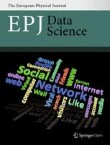The 21st century is witnessing the establishment of data-driven science as a complementary approach to the traditional hypothesis-driven method. This (r)evolution accompanying the paradigm shift from reductionism to complex systems sciences has already transformed the natural sciences and is about to bring the same changes to the techno-socio-economic sciences, viewed broadly.
EPJ Data Science offers a publication platform to showcase the latest contributions to the study of techno-socio-economic systems, wherein “digital traces” of human activity are used as first-order objects for the investigation. Specifically, the focus of the journal is on analyzing and synthesizing massive data sets to achieve new insights into societal phenomena and behavior. Application domains include, but are not limited to, social interaction (including animal societies), economic and financial systems, management and business networks, socio-technical infrastructure, health and environmental systems, the science of science, as well as general risk and crisis scenario forecasting up to and including policy advice. Methodologically, EPJ Data Science welcomes approaches from a broad range of disciplines, spanning statistically rigorous analysis of data, social network analysis, complex systems, applied machine learning, and more.
Papers submitted to this journal should not only strive to improve on existing data science methodologies but must provide new insight into human or social behavior or systems, in the areas outlined above. Submissions that focus on purely descriptive statistics or apply standard techniques to mainstream datasets are unlikely to be considered for publication.
Thus, EPJ Data Science offers a publication platform to bring together diverse academic disciplines concerned with challenges around:
- How to extract signals about techno-socio-economic systems from large, complex data
- How to interpret these signals in the theoretical context of the relevant disciplines
- How to find new empirical laws, or fundamental theories, concerning how societies work



